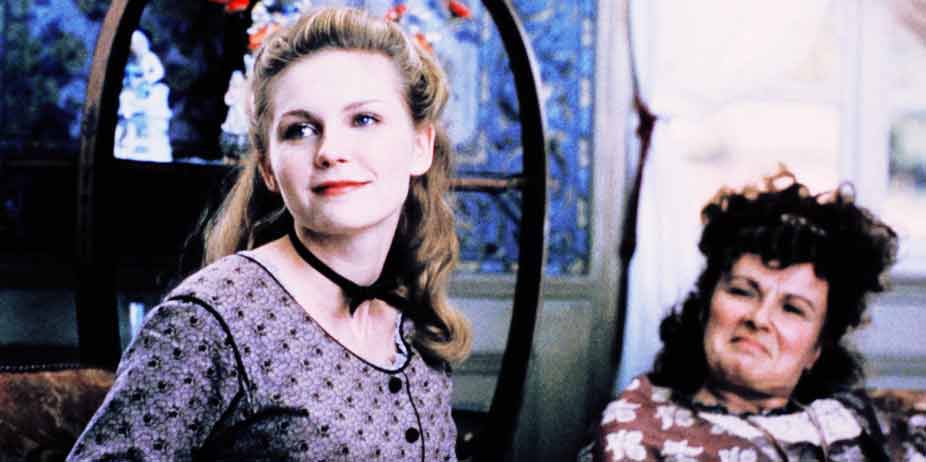
Lover's Prayer (2000)
This Independent Foreign Film is a difficult one to review since its classification seems irregular. Lover's Prayer (also known by the alternate title All Forgotten) is based on two short stories by individual Russian authors, and much of the story is brought to the screen as though we were reading the tale. The stories do combine but one falls to the sidelines as the other, stronger plot takes control. As a result, there are many loose ends and unidentified reasons behind the production itself. From a purely visual standpoint, the film is exquisite, with an excellent cast, gorgeous countryside and stunning costuming.
The film plays like a romantic piece of poetry, beautiful even while dealing with some surprisingly dark and sinister elements. Essentially it is the tale of a boy's journey to manhood, and the first time he "fell in love." Vladamir (Nick Stahl) is on the brink of manhood, raised under the domineering control of his wealthy parents. His future is in a political career or some established office in the law, as dictated by his overly aggressive mother. But the summer is to be spent in the countryside, where he may indulge in the last of his freedom before leaving for college. Life is uneventful until new neighbors assume the manor across the lane. Bygone royalty, Princess Zasychin's husband has died, leaving her with a title but very little money. They rely on friends of influence, the charity of others, and the charm of her beautiful daughter Zinaida (Kirsten Dunst) in order to gain favor in society. Vladamir is enthralled with Zinaida, along with many other young men in the parish. She is beautiful, controlling, spoiled, and wonderful.
Able to twist any man around her finger (and having among those willing a poet, a count, a commander, and numerous other hopeful suitors), Zinaida seems to have an affection for him as well -- but in a humoring, childish esteem. "You are my Page," she tells him. "You must follow me everywhere!" But her enthralling personality seems to change over the following weeks. She loses her good humor and patience, and becomes more condescending and harsh on her would-be lovers. Vladamir is convinced something beyond "mere bad health" is amiss, and in his investigations discovers a horrifying secret which will threaten his happy life forever, and bring his beautiful fairytale princess to ruin. In addition to this main plot there runs another story concerning one of the surfs on the estate. Mashenka is an unhappily married young wife whose husband is off serving in the wars. Betrothed to him "against her will," she finds herself falling in love with a local stableman in Vladamir's father's employment.
Though they do conduct an affair, her lover insists it be broken off and repented of when her husband returns from battle. This plot seems to end rather abruptly with the final confession, leaving us to draw our own conclusions as to what happened with the fateful lovers. It proves to be merely one of the unexplained plots in Lover's Prayer, which shows us many things but never manages to give the reasoning behind all of them. It's not badly written, but seems incomplete. I would have appreciated some follow-up, though Russian writers are not esteemed for completeness in their novels. The finest thing about this film is its performances. Kirsten Dunst is enthralling as the beautiful but devious Zinaida, who has many secrets and in the end comes to repentance for her flaws. Not only is Kirsten utterly ravishing in the period costumes, but there's a sensual sort of power she holds over the camera. I've have the pleasure of observing her in numerous films, and this is by far her finest achievement, deserving of an Oscar. There's also a fine supporting cast involving Julie Walters, Nicholas Rowe, Nathaniel Parker, and Geraldine James. The costuming is utterly beautiful, the cinematography interesting, and the story interesting, though not without its moral flaws. For being a PG13 film, the story has only mild language and brief violence.
Where visual content fails to come into play, things are still heavily implied. At the risk of giving away spoilers, Zinaida turns out to be carrying on an affair with a much older, married man. There is also the adulterous subplot between the surfs, who confess their sin before the woman's husband and presumably break off their affair. Along with Vladamir, we witness Zinaida through a window as she takes precautions against pregnancy (by standing over a steaming pot), before her lover hurries out across the garden. Prostitutes are seen in the background of one scene. Zinaida encourages a woman to "strip" and go skinny dipping, to prove the pond is safe for her own use. They only get as far as undressing down to their petticoats. Language is mild, with the exception of one Christ, and a quarrel between the adulterous man and his wife in which they shout over "the whore" and his being a "b*stard." He turns on her and slaps her to the ground, but is prevented from abusing her further.
There are also conflicting religious ideals in this film; while being predominately Catholic, the characters resort to "last-minute" confession of their sins, but also indulge in silly rituals to "cleanse" them of flaws. The movie is disturbing on an intellectual level because of the turn it takes, and by engaging in moral relativism. Are they right or wrong? It seems to be up to the audience to decide, and this kind of uncertainty is dangerous. They're likable while being immoral, and in the end the narrator concludes that he would not have given up that summer for anything... even though it ruined four lives in the process.
